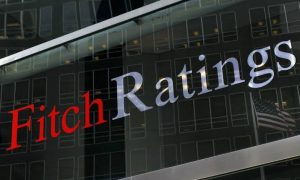Onome Amuge
Fitch Ratings has flagged the possibility of significant hurdles in Nigeria’s efforts to stabilize its economy, stressing that failure to meet fiscal deficit reduction targets could impede the country’s progress.
According to the global credit rating agency, if the budget deficit is larger than expected in 2025, this could result in a further decline in the naira’s value, elevated inflation, and higher borrowing costs for the government.
These developments, the agency noted, could jeopardise the government’s ability to carry out its reform agenda, posing a serious threat to the economy as a whole.
Fitch’s recent report zeroed in on the federal government’s 2025–2027 Medium-Term Expenditure Framework, which predicts a reduction in the budget deficit. However, Fitch cast doubt on the framework’s assumptions, specifically oil prices of $75 per barrel and production of 2.06 million barrels per day, which include condensates.
These projections, Fitch observed, are more optimistic than its own estimates, which project oil prices of $70 per barrel and production of 1.77mbpd.
“Reducing the deficit in line with the MTEF would provide further credibility for the government’s reform agenda, but if the deficit target is missed, it may increase the pressure for further naira depreciation, as well as putting upward pressure on prices and interest rates.
“A deficit significantly larger than what we projected in our November 1 assessment, when we affirmed Nigeria’s rating at ‘B-’ with a Positive Outlook, could complicate the task of establishing macroeconomic stability and potentially damage policy credibility,” it stated.
According to the credit rating agency, while the government’s drive to boost non-oil revenues is commendable, its proposal to raise Value Added Tax (VAT) from 7.5 percent to 10 percent in 2025 could encounter political backlash.
Moreover, Nigeria’s revenue-to-GDP ratio, which remains among the lowest globally, is projected by Fitch to average 10.3 percent in 2024–2025, well below the 19 percent median for ‘B’-rated sovereigns, further underscoring the country’s fiscal challenges.
Fitch emphasised the critical importance of Nigeria’s efforts to raise fiscal revenues, especially from more reliable non-oil sources, as a key step towards improving the country’s credit profile and achieving macroeconomic stability.
The global credit rating agency also cautioned that failing to meet the fiscal deficit target could result in increased pressure on the exchange rate, potentially exacerbating the country’s already volatile currency situation.
While Nigeria has taken steps to streamline its exchange-rate regime and tighten monetary policy, the naira has faced renewed depreciation pressure, which has led to a divergence between the official and parallel market exchange rates in recent months.
This renewed pressure on the currency highlights persistent foreign exchange constraints in the country, despite efforts to stabilise the currency.
In its assessment, Fitch acknowledged the introduction of an electronic FX matching platform on December 2, 2024, as a positive move towards increased transparency in Nigeria’s currency markets.
However, the agency also noted that progress in addressing the country’s foreign exchange challenges has been slower than expected.
On the positive side, Nigeria’s recent economic reforms are seen to have boosted its external buffers.
Nigeria’s official foreign exchange reserves experienced a surge from $32.2 billion in April to $40.2 billion in November 2024. This increase provided coverage for about six months of current external payments, which is significantly above the 3.7 months median for countries rated ‘B’ by Fitch.
The expansion of Nigeria’s official reserves was underpinned by several notable inflows. These included a $917 million foreign currency-denominated bond issued in August, a $750 million disbursement from the World Bank in November, and the successful issuance of $2.2 billion in Eurobonds earlier this month. The Eurobond issuance, completed on December 3, was composed of a $700 million 6.5-year note and a $1.5 billion 10-year note.
While Nigeria’s official foreign exchange reserves experienced an upward trend, Fitch highlighted lingering concerns about the transparency of the country’s exchange-rate policy, specifically in relation to the net reserves held by the government.
Fitch observed that a persistent lack of clarity in certain key areas, particularly in relation to the exchange-rate policy, has continued to undermine investor confidence and hamper the overall effectiveness of economic reforms designed to stabilise the country’s economy.









